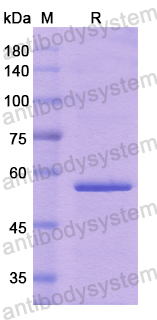Catalog No.
YHA84501
Expression system
E. coli
Species
Homo sapiens (Human)
Protein length
Cys30-Pro508
Predicted molecular weight
56.49 kDa
Nature
Recombinant
Endotoxin level
Please contact with the lab for this information.
Purity
>90% as determined by SDS-PAGE.
Accession
O60242
Applications
ELISA, Immunogen, SDS-PAGE, WB, Bioactivity testing in progress
Form
Lyophilized
Storage buffer
Lyophilized from a solution in PBS pH 7.4, 0.02% NLS, 1mM EDTA, 4% Trehalose, 1% Mannitol.
Reconstitution
Reconstitute in sterile water for a stock solution. A copy of datasheet will be provided with the products, please refer to it for details.
Shipping
In general, proteins are provided as lyophilized powder/frozen liquid. They are shipped out with dry ice/blue ice unless customers require otherwise.
Stability and Storage
Use a manual defrost freezer and avoid repeated freeze thaw cycles. Store at 2 to 8°C for frequent use. Store at -20 to -80°C for twelve months from the date of receipt.
Alternative Names
Brain-specific angiogenesis inhibitor 3, KIAA0550, ADGRB3, Adhesion G protein-coupled receptor B3, BAI3
Regulation of hippocampal excitatory synapse development by the adhesion G-protein coupled receptor brain-specific angiogenesis inhibitor 2 (BAI2/ADGRB2)., PMID:40451404
Regulation of hippocampal excitatory synapse development by the adhesion G-protein coupled receptor Brain-specific angiogenesis inhibitor 2 (BAI2/ADGRB2)., PMID:39975290
Identification of selective sweep and associated QTL traits in Iranian Ovis aries and Ovis orientalis populations., PMID:39748948
Identifying low-density, ancestry-informative SNP markers through whole genome resequencing in Indian, Chinese, and wild yak., PMID:39501152
Suppression of non-muscle myosin II boosts T cell cytotoxicity against tumors., PMID:39485850
Genomic Study of Taste Perception Genes in African Americans Reveals SNPs Linked to Alzheimer's Disease., PMID:39372803
Genomic study of taste perception genes in African Americans reveals SNPs linked to Alzheimer's disease., PMID:39284855
C1ql1 expression in oligodendrocyte progenitor cells promotes oligodendrocyte differentiation., PMID:39257292
Efficacy of durvalumab plus chemotherapy in advanced biliary duct cancer and biomarkers exploration., PMID:39235609
Creation of a novel CRISPR-generated allele to express HA epitope-tagged C1QL1 and improved methods for its detection at synapses., PMID:38858133
Upregulation of mRNA Expression of ADGRD1/GPR133 and ADGRG7/GPR128 in SARS-CoV-2-Infected Lung Adenocarcinoma Calu-3 Cells., PMID:38786015
Brain-Specific Angiogenesis Inhibitor 3 Is Expressed in the Cochlea and Is Necessary for Hearing Function in Mice., PMID:38069416
Omics-CNN: A comprehensive pipeline for predictive analytics in quantitative omics using one-dimensional convolutional neural networks., PMID:38027840
Mapping and targeting of C1ql1-expressing cells in the mouse., PMID:37845276
Unveiling Mechanical Activation: GAIN Domain Unfolding and Dissociation in Adhesion GPCRs., PMID:37831892
Loss of Brain Angiogenesis Inhibitor-3 (BAI3) G-Protein Coupled Receptor in Mice Regulates Adaptive Thermogenesis by Enhancing Energy Expenditure., PMID:37367869
Generation and initial characterization of mice lacking full-length BAI3 (ADGRB3) expression., PMID:37337931
Integration of transcriptome sequencing and whole genome resequencing reveal candidate genes in egg production of upright and pendulous-comb chickens., PMID:36739803
Genome-wide placental DNA methylations in fetal overgrowth and associations with leptin, adiponectin and fetal growth factors., PMID:36585686
NLRC5 Might Promote Endometrial Cancer Progression by Inducing PD-L1 Expression., PMID:35880269
A correlation study of adhesion G protein-coupled receptors as potential therapeutic targets in Uterine Corpus Endometrial cancer., PMID:35413679
Variants Within Genes EDIL3 and ADGRB3 are Associated With Divergent Fecal Egg Counts in Katahdin Sheep at Weaning., PMID:35360858
Identification of hub genes in colorectal cancer based on weighted gene co-expression network analysis and clinical data from The Cancer Genome Atlas., PMID:34308980
miR-142 downregulation alleviates the impairment of spatial learning and memory, reduces the level of apoptosis, and upregulates the expression of pCaMKII and BAI3 in the hippocampus of APP/PS1 transgenic mice., PMID:34302879
Genetic underpinnings of affective temperaments: a pilot GWAS investigation identifies a new genome-wide significant SNP for anxious temperament in ADGRB3 gene., PMID:34075027
Rare functional genetic variants in COL7A1, COL6A5, COL1A2 and COL5A2 frequently occur in Chiari Malformation Type 1., PMID:33974636
Tethered agonist exposure in intact adhesion/class B2 GPCRs through intrinsic structural flexibility of the GAIN domain., PMID:33497605
The high frequency of chromosomal copy number variations and candidate genes in epilepsy patients., PMID:33484953
C1QL3 promotes cell-cell adhesion by mediating complex formation between ADGRB3/BAI3 and neuronal pentraxins., PMID:33337553
Phosphatidylserine on viable sperm and phagocytic machinery in oocytes regulate mammalian fertilization., PMID:31575859
Whole-genome analysis identifying candidate genes of altitude adaptive ecological thresholds in yak populations., PMID:31062447
Several genotypes, one phenotype: PIK3CA/AKT1 mutation-negative hidradenoma papilliferum show genetic lesions in other components of the signalling network., PMID:31010589
A simple genotyping method to detect small CRISPR-Cas9 induced indels by agarose gel electrophoresis., PMID:30872606
Biallelic intragenic duplication in ADGRB3 (BAI3) gene associated with intellectual disability, cerebellar atrophy, and behavioral disorder., PMID:30659260
Expression patterns of C1ql4 and its cell-adhesion GPCR Bai3 in the murine testis and functional roles in steroidogenesis., PMID:30608882
Spatiotemporal regulation of the GPCR activity of BAI3 by C1qL4 and Stabilin-2 controls myoblast fusion., PMID:30367035
Complement 1q-like-3 protein inhibits insulin secretion from pancreatic β-cells via the cell adhesion G protein-coupled receptor BAI3., PMID:30228187
An investigation into the potential role of brain angiogenesis inhibitor protein 3 (BAI3) in the tumorigenesis of small-cell carcinoma: a review of the surrounding literature., PMID:28537194
C1ql1/Ctrp14 and C1ql4/Ctrp11 promote angiogenesis of endothelial cells through activation of ERK1/2 signal pathway., PMID:27734226
Emerging Roles of BAI Adhesion-GPCRs in Synapse Development and Plasticity., PMID:26881134
International Union of Basic and Clinical Pharmacology. XCIV. Adhesion G protein-coupled receptors., PMID:25713288
Anterograde C1ql1 signaling is required in order to determine and maintain a single-winner climbing fiber in the mouse cerebellum., PMID:25611509
G-protein coupled receptor BAI3 promotes myoblast fusion in vertebrates., PMID:24567399
BAI3, CDX2 and VIL1: a panel of three antibodies to distinguish small cell from large cell neuroendocrine lung carcinomas., PMID:24266897
The adhesion-GPCR BAI3, a gene linked to psychiatric disorders, regulates dendrite morphogenesis in neurons., PMID:23628982
A novel evolutionarily conserved domain of cell-adhesion GPCRs mediates autoproteolysis., PMID:22333914
Regulation of the Bcas1 and Baiap3 transcripts in the subthalamic nucleus in mice recovering from MPTP toxicity., PMID:21514331
The cell-adhesion G protein-coupled receptor BAI3 is a high-affinity receptor for C1q-like proteins., PMID:21262840
A multi-stage multi-design strategy provides strong evidence that the BAI3 locus is associated with early-onset venous thromboembolism., PMID:20946148
The genetics of symptom-based phenotypes: toward a molecular classification of schizophrenia., PMID:18628273

